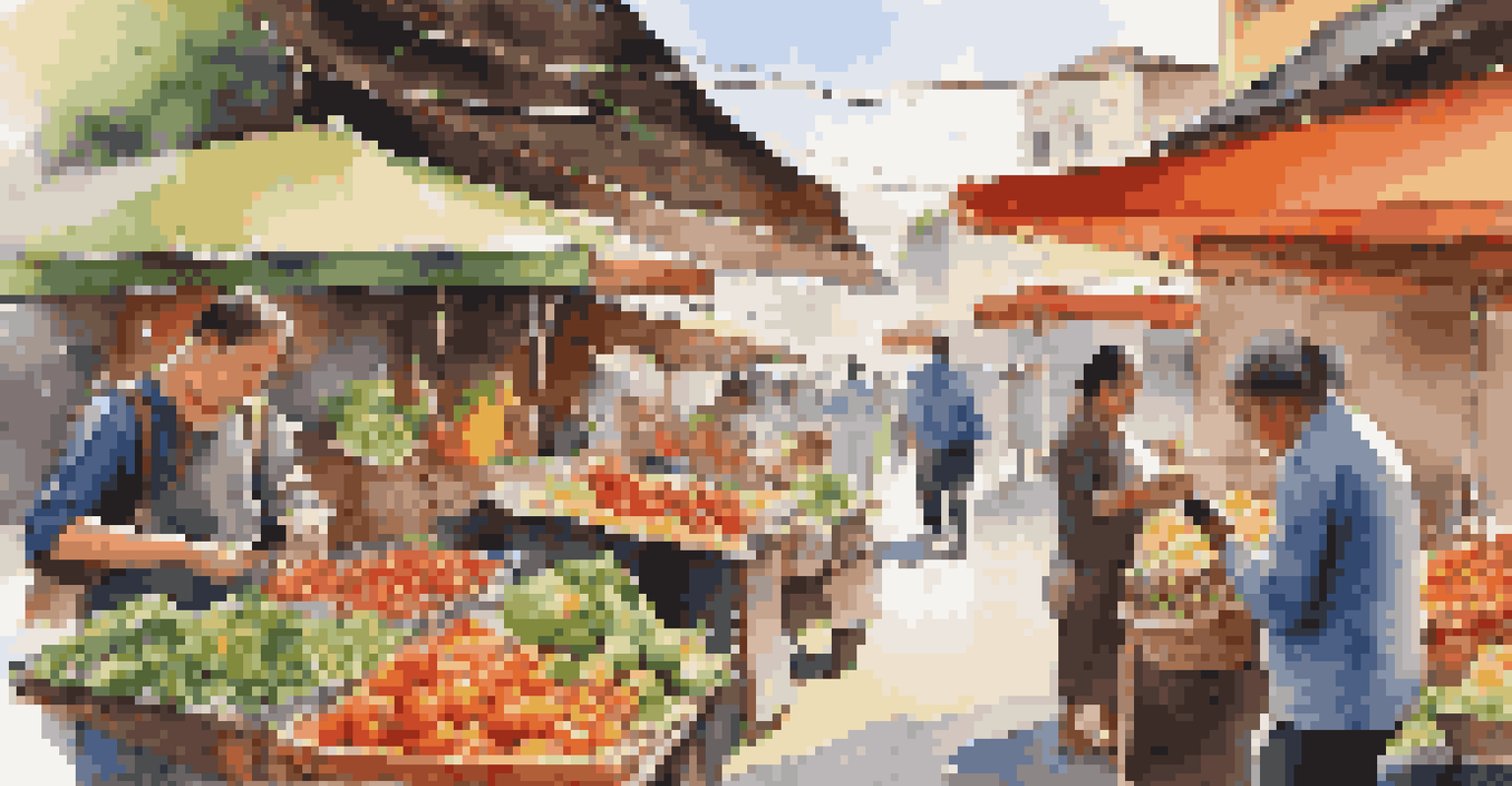Traveling with a Special Diet: Planning for Success

Understanding Your Special Diet Before Traveling
Before embarking on your journey, it’s crucial to fully understand your special diet. Whether you’re gluten-free, vegan, or have allergies, knowing what you can and cannot eat will help you make informed choices. Familiarize yourself with foods that fit your diet and those that don’t, as this knowledge will empower you during your travels.
Traveling – it leaves you speechless, then turns you into a storyteller.
Additionally, consider consulting a nutritionist for personalized advice tailored to your dietary needs. They can provide insights on how to manage your diet while away from home, including potential food swaps and meal ideas. This preparation will help alleviate stress and enhance your overall travel experience.
Finally, creating a list of acceptable foods can serve as a handy reference during your trip. Keep it accessible on your phone or printed out, and you’ll feel more equipped to handle any unexpected dining situations.
Researching Destinations and Dining Options
In today’s digital age, researching your destination and dining options is easier than ever. Use apps and websites dedicated to dietary needs, such as HappyCow for vegan choices or AllergyEats for allergy-friendly restaurants. This will help you find restaurants that cater to your specific requirements, ensuring you have delicious and safe dining experiences.

Don’t forget to check out local grocery stores or markets. These places often provide fresh ingredients and snacks that align with your diet. This can also be a fun way to explore local cuisine while ensuring you have healthy options available.
Know Your Diet Before Traveling
Understanding your dietary restrictions and preparing accordingly ensures you make informed choices while on your journey.
Remember to read reviews and connect with fellow travelers who share your dietary restrictions. Online forums and social media groups can be treasure troves of advice on where to eat and what to avoid, making your research even more comprehensive.
Packing Snacks and Emergency Food Supplies
Packing snacks and emergency food supplies can be a lifesaver while traveling. Whether it’s protein bars, nuts, or dried fruit, having a stash of compliant snacks ensures you won’t go hungry during long travel days or when healthy options are scarce. This is especially important if you’re traveling to areas where your dietary needs may not be well understood.
The journey not the arrival matters.
When selecting snacks, consider portion control and packaging. Opt for items that are easy to transport and won’t spoil quickly. This way, you can enjoy your favorite treats without worrying about mess or waste.
Additionally, inform your travel companions about your dietary restrictions. This way, they can support you in finding suitable food options, and you’ll feel more included in group meals.
Communicating Your Dietary Needs Effectively
Effective communication is key when dining out while traveling with a special diet. Always inform the restaurant staff about your dietary requirements as soon as you're seated. This helps ensure they take your needs seriously and can offer suitable menu options.
Don’t hesitate to ask questions about ingredients and cooking methods—this is your health at stake! Most restaurants are accustomed to accommodating various dietary needs, so being clear and polite will go a long way in securing safe meals.
Research Dining Options Ahead
Utilizing apps and connecting with communities can help you find restaurants that cater to your dietary needs.
If you're traveling internationally, consider learning a few key phrases in the local language related to your diet. This can help bridge communication gaps and make it easier to explain your restrictions.
Finding Supportive Communities While Traveling
Traveling with a special diet can sometimes feel isolating, but finding supportive communities can make a world of difference. Look for online forums, local meetups, or social media groups where fellow travelers share their experiences and tips. Connecting with others who understand your dietary journey can provide both reassurance and practical advice.
Additionally, consider reaching out to local health food stores or cafes upon arrival. These places often have information about dietary-friendly restaurants and may even host community events where you can meet like-minded individuals.
By surrounding yourself with supportive people, you’ll not only enhance your travel experience but also create lasting friendships along the way.
Staying Flexible and Open-Minded
While it’s essential to stick to your dietary needs, maintaining flexibility and an open mind during travel can lead to delightful discoveries. Sometimes, you might come across unexpected food options that fit your diet perfectly. Embracing local flavors can add richness to your travel experience and help you appreciate different cultures.
However, this doesn’t mean compromising your health. Always prioritize your well-being and make choices that align with your diet. It’s all about finding the right balance between enjoying new experiences and staying true to your needs.
Pack Snacks for Emergencies
Bringing compliant snacks can prevent hunger and stress during travel, especially in areas with limited food options.
By remaining adaptable, you can navigate any challenges that arise, ensuring that you make the most of your travel adventure.
Documenting Your Travel Experiences with a Special Diet
Documenting your travel experiences can be incredibly rewarding, especially when navigating a special diet. Consider keeping a travel journal or blog to share your journey with others facing similar dietary challenges. This can serve as a resource for future travelers and allow you to reflect on your own experiences.
Include notes on restaurants, meals, and any tips that helped you along the way. Highlighting both successes and challenges can provide a balanced perspective and encourage others to stay committed to their dietary needs while traveling.

Additionally, sharing your journey on social media can inspire and connect with a wider audience. You never know who might benefit from your insights!